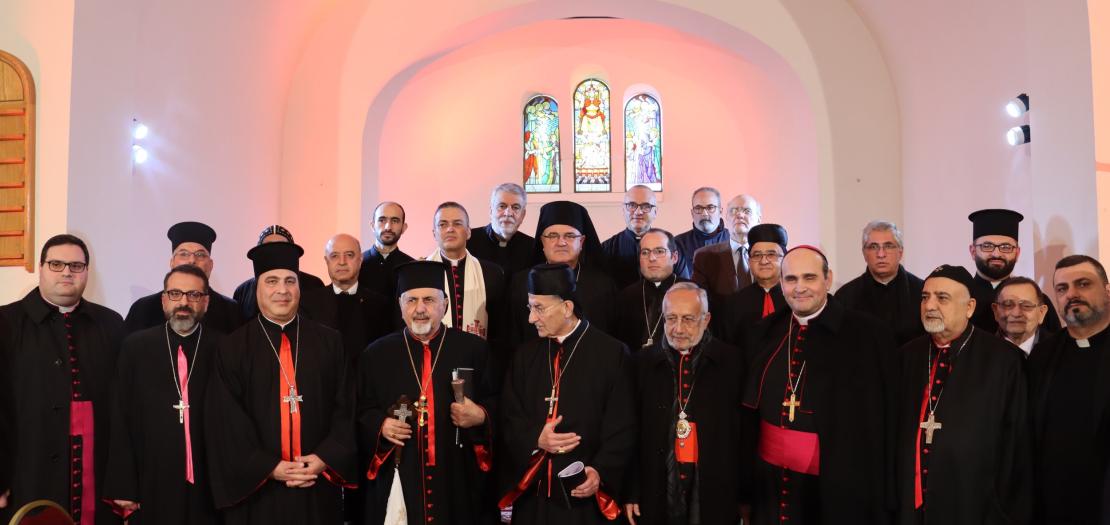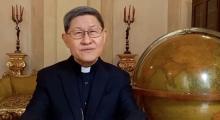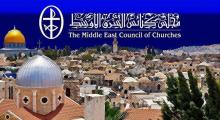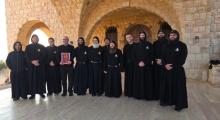Issued by the Catholic Center for Studies and Media - Jordan. Editor-in-chief Fr. Rif'at Bader - موقع أبونا abouna.org

With a lot of hope, the “Week of Prayer for Christian Unity” ended with a Prayer Service held on Sunday 28 January 2024, hosted by the Evangelical Episcopal Anglican Church of All Saints in Downtown Beirut. It was part of the celebrations organized in Lebanon by the Episcopal Committee for Ecumenical Relations at the Council of Catholic Patriarchs and Bishops in Lebanon, in partnership with the Middle East Council of Churches (MECC).
Attendees were the Apostolic Nuncio to Lebanon His Excellency Monsignor Paolo Borgia, His Beatitude Patriarch Cardinal Mar Bechara Boutros Al-Rai, Maronite Patriarch of Antioch and All the East, His Beatitude Patriarch Raphaël Bedros XXI Minassian, Catholicos of the Armenian Catholic Church of Cilicia, and MECC President for the Catholic Family, Reverend Dr. Paul Haidostian, President of the Union of the Armenian Evangelical Churches in the Near East (UAECNE), President of Haigazian University in Lebanon and MECC President for the Evangelical Family, His Beatitude Patriarch Mor Ignatius Youssef III Younan, Syriac Catholic Patriarch of Antioch and MECC Honorary President, His Beatitude Patriarch Youssef Al-Absi, Greek Melkite Patriarch of Antioch and All the East and MECC Honorary President, represented by His Eminence Metropolitan George Bacouni, Greek Melkite Catholic Metropolitan of Beirut, Byblos and their Dependencies, Reverend Dr. Habib Bader, President of the National Evangelical Union in Lebanon, and MECC Honorary President, Reverend Joseph Kassab, President of the National Evangelical Presbyterian Church, President of the Supreme Synod of the Evangelical Community in Syria and Lebanon and Secretary General of the National Evangelical Synod, and Father Andraos Al Anthouny, the Pastor of the Coptic Orthodox Church in Lebanon and the representative of the Church in Lebanon and Syria.
Archdeacon Imad Zoorob, pastor of the Evangelical Episcopal Anglican Church in Lebanon, responsible of the Church of All Saints for its Arab and Foreign Parishes in Lebanon, and the Church of All Saints in Syria, presided over the service. Attendees were Bishops, Priests and Pastors from different Church Families, Dr. Michel Abs, the Secretary General of the Middle East Council of Churches (MECC), accompanied by a team from the MECC General Secretariat, Dr. Mike Basous, the Secretary General of the Bible Society, official personalities, parishioners and believers from all Churches.
Following an opening speech addressed by Father Tanios Khalil, Dean of the Faculty of Theology at La Sagesse University in Lebanon, and Member of the Episcopal Committee for Ecumenical Relations for the Council of Catholic Patriarchs and Bishops, the Service included the Ecumenical Prayer from the “Week of Prayer for Christian Unity” booklet for this year, which is entitled “You shall love the Lord your God... and your neighbor as yourself” (Luke 10:27). His Beatitude Patriarch Raphaël Bedros XXI Minassian read the Epistle of Saint Paul to the Romans (12:5-18), His Beatitude Patriarch Mor Ignatius Youssef III Younan read a Chapter from the Gospel according to Matthew (25: 31-46), and then His Beatitude Patriarch Cardinal Mar Bechara Boutros Al-Rai addressed a Sermon. The Service also included various readings, reflections, and hymns performed by the Church choir.
At the beginning of the service, Archdeacon Imad Zoorob delivered the speech of His Eminence Bishop Hosam Elias Naoum, the Anglican archbishop in Jerusalem, and the Primate of the Episcopal Province of Jerusalem and the Middle East, in which he said, “We meet together on this blessed evening to raise together one Prayer to the Lord of Glory, a Prayer of our unity as one Christian family and as one unifying Church, not only from the land of the Saints in Lebanon and in particular from the Church of All Saints in Beirut, but also and in conjunction with our one and gathered Churches on this evening in the land of holiness in our beloved Jerusalem, where the Church of the Nativity is, in the land whose soil has been soaked from the love and redemption of our Lord Jesus Christ...”
He added, "I am remorse that I couldn’t be able to be with Your Beatitudes on this blessed evening, as you are in your Church to celebrate together, heart and soul, the conclusion of the Week of Unity Prayer, to affirm together our eternal and everlasting unity. However, the Divine Providence made me present, for this particular occasion, in Rome and Canterbury, and hosted by His Holiness the Supreme Pontiff Pope Francis and His Beatitude the Archbishop of Canterbury Justin Welby, who called the Bishops from both Churches to work and grow together in unity and witness to the one body of Christ... We also congratulate the beloved Middle East Council of Churches on the occasion of its Fiftieth Jubilee, praying that the closing Prayer for this evening will be a Prayer of dedication to the Icon of Pentecost, the Icon of unity, love and the unifying spirit…”
His Beatitude Patriarch Cardinal Mar Bechara Boutros Al-Rai started his sermon with the Bible Verse “Whatever you did for one of the least of these brothers and sisters of mine, you did for me,” (Matthew 25:40) and indicated that with these words, Lord Jesus assures us that in the evening of life we will be judged for our social love for our brothers and sisters in a humanity who are in need... The dimension of social love service constitutes an essential element in strengthening the bonds of Ecumenical relations between the various Churches. Love unites, and indifference divides. Our “little brothers” provide us with this Ecumenical occasion, and put us on the path of love to walk towards Christ.”
His Beatitude stressed that “the social service of love unites us with an Ecclesiastical bond, because the needy people are beyond any church or sectarian affiliation, so people are not asked about their affiliation as a condition for helping them. The acts of love added to Prayer, life dialogue, official Theological dialogue, and hearing the word of God in meetings and occasions, as well as the various initiatives, put all Christians, regardless of their Churches, on the path towards the unity that Jesus Christ wants.”
For his part, Dr. Michel Abs, the secretary general of the Middle East Council of Churches, delivered a speech in which he said, “We are one, no matter what they say, no matter how much we disagree, and even how we quarrel. If we had not been one, there would have been no disagreement or conflict. If we had not differed, we would have been in a state of indifference towards the message of salvation, and it would not have spread in all corners of the earth and throughout the globe... Let no one think that unity requires complete dissolution between components, or reproduction from one component to another. This is contrary to human nature and the structure of societies. Unity is the preservation of aspirations even if the means differ.”
He continued, "For fifty years, the Church of Christ has been meeting, praying, glorifying the Creator, and restoring the message of the Redeemer in all its Divine and human dimensions. Isn't this unity? We do not mean by this at all that the Middle East Council of Churches is Christian unity, but rather it is the qualifying framework for the manifestation of this unity. It is nothing but an institution that the Church created it in order to express its unity. Its true unity is achieved in the meetings between its Leaders, and gradually among its people. Diversity and difference are rich, and are the result of basic Christian values, the first of which is freedom, that produces the creativity which made Christianity take on all the manifestations that we see in the world today. This is the result of the acceptance of the Master’s message by countless peoples, civilizations and cultures.”
Then, His Eminence Monsignor Raphael Trabelsi, the episcopal vicar general of the Chaldean Church in Lebanon, delivered the speech of His Eminence Archbishop Youssef Soueif, Maronite Archbishop of Tripoli and President of the Episcopal Committee for Ecumenical Relations at the Council of Catholic Patriarchs and Bishops in Lebanon, in which he mentioned that in this year’s Week of Prayer, “we understood from the scene of the Samaritan our Ecumenical journey for this year, which we seek to live continuously in our Pastoral as well as social lives. Thus, we bear witness to the Ecumenism of initiative, the Ecumenism of solidarity, the Ecumenism of care, and the Ecumenism of synod, so that we may pray and crown them with the Ecumenism of love. Absolute love expressed by the Lord Jesus, who humbled Himself by becoming obedient to the point of death on the cross, becoming a pure sacrifice and raising us with Him to the Father. A love that is manifested by the Ecumenism of the blood drawn by the martyrs of faith in our region and in the world, and their blood calls and invites us to bear the responsibility of faith in the spirituality of unity.”
He added, "It is a love that makes us return and discover our Antiochian and Eastern heritage, which creates a Pastoral and spiritual space through which we can work together in Theological and Ecclesiastical frameworks. A love that strengthens us in front of the major challenges facing our youth as they drift behind immoral currents and turn away from the Spirit of God and the Gospel. Our work together is a greater testimony for this youth to meet Christ and strengthen its affiliations with the Church. A love that we embody through Ecumenical actions that require spiritual, human and cultural maturity and humility, and are evidence that Man has been liberated from the ego.”
During the Service, believers and Church Leaders united together in praising the Lord, hoping that the Prayer of Unity would continue throughout the year, hoping for this unity that has been waited for decades. Following the Service, the worshipers gathered in an agape prepared by the students of the Saint Luke Center which is affiliated with the Episcopal Church.







